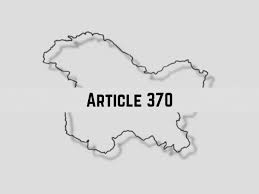From delimitation in Jammu and Kashmir to voting rights to West Pakistan Refugees, a host of decisions will be impacted by the SC verdict on pleas challenging the changes made to Article 370. Here are the crucial ones
On Monday, when the Supreme Court announces its verdict on a clutch of petitions challenging the changes made to Article 370 of the Constitution and the dividing of the erstwhile state of Jammu and Kashmir into two Union Territories, the judgement will impact several major decisions taken by the Centre in the past four years.
So what are the policy decisions that will be impacted by the upcoming Supreme Court verdict?
Article 370: (Special status of Jammu and Kashmir): Article 370 gave special status to Jammu and Kashmir in the Indian Union and restricted the Centre’s legislative powers with respect to the state. It gave the state legislature special powers to draft its own Constitution.
Article 35-A: Article 35-A was introduced into the Constitution through Article 370. If the Supreme Court dismisses the petitions, it would automatically scrap Article 35-A. Article 35-A empowered the Jammu and Kashmir state legislature to define the permanent residents of the state and their special rights and privileges.
It is this Article that restricted people other than the permanent residents of Jammu and Kashmir from buying land in the state. It also reserved government jobs for permanent residents only.
Re-organisation of Jammu and Kashmir: On August 5, 2019, the same day it made changes to Article 370, the Centre also reorganised the erstwhile state of Jammu and Kashmir into two Union Territories — Ladakh and Jammu and Kashmir. Ladakh was carved out as a UT without a legislature, while Jammu and Kashmir had a legislative body. With no elections having taken place in Jammu and Kashmir, both the Union Territories are being administered by the Centre-appointed Lt Governors.
Delimitation of parliamentary and legislative constituencies:With the re-organisation of Jammu and Kashmir, the Centre also formed the Delimitation Commission led by Justice (retd) Ranjana Prakash Desai in March 2020. The Commission embarked on a massive delimitation exercise to delineate the Assembly and Parliament constituencies in the Union Territory.
Jammu and Kashmir political parties objected to this, citing the petitions pending before the Supreme Court. In May 2022, the Commission notified its award. While major changes were made in the Parliamentary constituencies, the Commission awarded six more seats to Jammu region as against only one seat to the Valley. The Commission also reserved nine Assembly seats for the Scheduled Tribes (STs) and seven for the Schedule Castes (SCs). J&K’s mainstream political parties termed this a “political” exercise to help BJP electorally in Jammu and Kashmir. They also described the Commission’s award as an attempt to “divide people on sectarian and social lines”. The Delimitation exercise was also challenged in the Supreme Court, but in February this year, the court dismissed the petition.
Voting rights to West Pakistan Refugees (WPRs): At the time of partition in 1947, many Hindu families from Pakistan migrated and settled mainly in Jammu region’s Kathua and Samba districts. While the West Pakistan Refugees are considered citizens of India and can vote in the Parliamentary elections, they couldn’t vote in the Legislative Assembly elections as they were not considered permanent residents of the state.
With the 2019 move, they have been given voting rights in Assembly elections as well. According to the Ministry of Home Affairs, there are 5,746 families of West Pakistan refugees settled in Jammu, while community leaders say the number of families has gone up to 20000.
Reservation of seats for Kashmiri pandits and displaced people from PoK: In a recent Bill in Parliament, the Centre reserved two seats for Kashmiri pandits and one seat for the displaced people from Pakistan-occupied Kashmir in the Legislative Assembly of the Union Territory.




